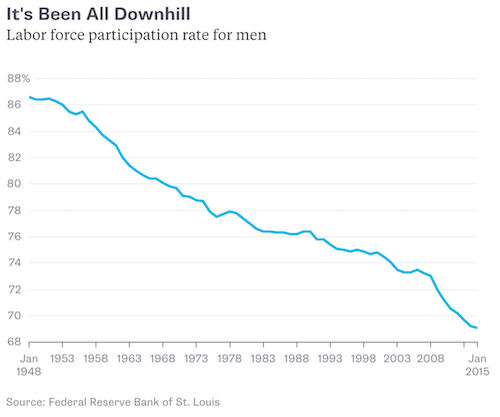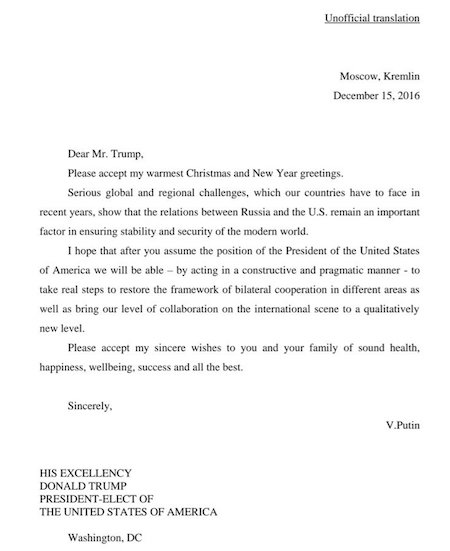
Alfred Palmer Annette del Sur in salvage campaign, Douglas Aircraft Co., Long Beach, CA 1942

Best ever case for basic income. And then he doesn’t even mention it!
• The Connection Between Work and Dignity (B.)
If we work hard and produce something of tangible value, we tend to feel a sense of self-worth when society rewards us for it with a decent, middle-class life. This was the essence of Franklin Roosevelt’s New Deal – if you work, you eat. The continuing power of this idea is visible everywhere. Witness Albuquerque, New Mexico, where the city gave homeless people jobs and it made them feel “human again.” Or look at the Job Corps program, where giving poor people jobs made them more likely to get married. If you give people work with tangible, visible value, you give them dignity. This, of course, is a reason the U.S.’s falling labor participation rate is such a concern – so many Americans are out of the workforce and are missing out on the dignity that comes with a job:

So is there work to be done in the U.S. that produces tangible, visible value? Of course there is. To realize this, just take a one-week trip to Japan. Where American sidewalks are cracked and uneven, Japanese ones are neat and beautiful. Where tables in American Starbucks are littered with crumbs and dirt, Japanese Starbucks tables get wiped down after every customer leaves. Where American cities like Chicago and Detroit are full of broken windows and crumbling facades, Japanese cities are clean and modern, with well-maintained, reliable public transit. Before we start complaining about make-work, let’s make the U.S. look like that. Let’s fix the sidewalks and renovate – or knock down and rebuild – all the old buildings. Let’s wipe down every Starbucks table, build quality public-transit systems and hire the workers to make them run on time.
And let’s take care of our people as well as our cities. Let’s provide child care for working moms, and elder care for old people. Let’s hire more teachers to reduce class sizes. These are all jobs that produce real, tangible results. When you fix up a building or build a train station, you can see the fruits of your labors. When you take care of an old person, you can see a real human being benefit. The value created by these jobs is a lot more tangible and clear than the value created by a lot of activities that the market rewards much more, such as high-frequency trading. The free-market age has made the economy more efficient, but it has come at a dramatic price – lost dignity for so many. The U.S. has moved away from the idea of a social compact with work at its core. That’s something that deserves to be reversed.

I warn you, don’t do it. Don’t even start reading. This innocent-enough looking ‘organic chemical professor’ with his cultivated hobo-under-the-bridge look has one thing in mind, and one only: to ruin your holidays. Being holed up with his review means no valuable and precious time left to spend with your families, letting the turkey burn in the oven (oh, would he like that!) and having no eyes for the beautiful snowy landscape out there. Talk about the Grinch who stole Christmas!
• 2016 Year In Review: A Clockwork Orange (Dave Collum)
With some notable exceptions, the mainstream media has degenerated into a steaming heap of detritus that is so bad now that it gets its own section. A congenital infobesity has morphed into late-stage disinfobesity. Enter social media—the fever swamp—to fill the void. As we shall see, however, all is not well there either. I sift and pan, looking for shiny nuggets of content that reach the high standards of a rant. Shout-outs to bloggers would have to include Michael Krieger, Charles Hugh Smith, Peter Boockvar, Bill Fleckenstein, Doug Noland, Jesse Felder, Tony Greer, Mike Lebowitz, Mish Shedlock, Charles Hugh Smith, and Grant Williams.
News consolidators and new-era media include Contra Corner, Real Vision, Heatstreet, and Automatic Earth. A carefully honed Twitter feed is a window to the world and the road to perdition. My actions speak to my enthusiasm for Chris Martenson and Adam Taggart at Peak Prosperity. However, if you gave me one lens through which to view the world, I would have to choose Zero Hedge (or maybe LadySonya.com).

Nice story. Don’t demonize the man. Give him a chance.
• A Week On Jury Duty With Rex Tillerson (Roden)
Nine years ago, I showed up to the Denton County Courthouse for jury duty and got myself picked for the job. A young girl had accused her mom’s boyfriend of sexual assault, and the case was being brought to trial. If you’ve ever served on a jury trial before, you understand the almost immediate yet very temporary bond that ties 12 strangers together who are randomly chosen from each of their private lives to fulfill a solemn public purpose. One of our first tasks was to choose our jury foreman. Perhaps it was his business suit, his impressive stature, or his charisma, but almost everyone in that jury room suggested that this middle-aged man with graying hair was likely the most fit for the task. Thanks, but I decline. I’m not interested in the spotlight, he told us. I didn’t think anything of it.
I had just bought my first BlackBerry and used my breaks to catch up on all the emails I was missing from my week at the courthouse. I recall leaving the jury room on a break with this man and remarking how busy I was and how much work I had to do. He smiled as he sat and read the paper. From the first day of jury selection, we all noticed another suited man always present in the courtroom. His presence was intriguing due to the ear piece in his ear. While grabbing lunch at Denton County Independent Hamburger on the square the second day of the trial, we noticed this mysterious man dining with our fellow juror who’d declined the foreman spot. The intrigue grew, and it was the talk of the jury: Who were these men? Finally, during a break in the jury room, one juror had the nerve to ask: “Who are you? And what do you do?”
Our fellow jury member was reading the paper again and pointed out an article with Exxon in the headlines. I work for them, he said humbly. There are a lot of people in this world who hate me for what I do, so they give me and my family guys like that to protect me. I immediately felt embarrassed for complaining about how much work I had to do. It didn’t take long before a few internet searches revealed that I was serving on this jury with the CEO of Exxon Mobil, Rex Tillerson. The trial concluded, and it was time for the jury to deliberate. The story was heartbreaking, and the facts of the case were clear enough to make the majority of the jury convinced of the guilt of this sexual offender of a little girl. But the defense did a good enough job to create a couple of hold-outs. As our deliberations came to a close, it appeared we might have a hung jury.
That’s when Tillerson began to speak. Humbly, delicately and without an ounce of condescension toward those who disagreed, he began walking us all through the details of the case. I even recall being moved by his thorough explanation about the nature of doubt and the standards set forth by our justice system. With great patience, this man who strikes multibillion-dollar deals with foreign heads of state brought our scrappy jury together — to bring a sexual predator to justice and to deliver justice for a scared and deeply wounded little girl. A local nonprofit was instrumental in fostering that young girl through this process, providing her counseling and legal help. I was so struck by their mission that I toured their facility the week after the case to learn how I could donate and volunteer to their cause.
On a whim, I decided to reach out to Tillerson to encourage him to do the same. I found an email for him online and sent him a note, touting the role this agency played in our trial and urging him to consider supporting the great work they do. To my surprise, I received an email back thanking me for my note and my jury service, and ensuring me that he would contact the agency. I later received a call from the director of that nonprofit to let me know that Tillerson followed through and gave a generous donation.

Putin was impressive. Among many other things, he announced cuts in defense spending from 4.7% of GDP in 2016, to 3.3%, and 2.8% in 2019. “If anyone is unleashing an arms race it’s not us … We will never spend resources on an arms race that we can’t afford.”
• Putin Shrugs Off Trump’s Nuclear Plans, Says Democrats Sore Losers (R.)
Russia’s Vladimir Putin said on Friday he was unfazed by President-elect Donald Trump’s plans to boost the U.S. nuclear arsenal, praising Trump for being in touch with U.S. public opinion while branding the Democrats sore election losers. Speaking at his annual news conference in Moscow, the Russian president said earlier comments he had made about his country’s own military modernization had been misunderstood in the United States and that he accepted that the U.S. military, not Russia’s, was the most powerful in the world. Putin said on Thursday Russia’s military was “stronger than any potential aggressor”. Trump later tweeted that the United States “must greatly strengthen and expand its nuclear capability until such time as the world comes to its senses regarding nukes.”
Asked to clarify his comments on Friday, MSNBC reported that Trump had said: “Let it be an arms race. We will outmatch them at every pass and outlast them all.” But Putin said he did not regard the United States as a potential aggressor and had only been talking about countries he thought might realistically launch an attack on Russia. “I was a bit surprised by the statements from some representatives of the current U.S. administration who for some reason started to prove that the U.S. military was the most powerful in the world,” Putin said, referring to State Department comments from Thursday. “Nobody is arguing with that.” Putin said he saw nothing new or remarkable about Trump’s own statement about wanting to expand U.S. nuclear capabilities anyway. “In the course of his election campaign he (Trump) spoke about the necessity of strengthening the U.S. nuclear arsenal, and strengthening the armed forces. There’s nothing unusual here,” said Putin.
“If anyone is unleashing an arms race it’s not us … We will never spend resources on an arms race that we can’t afford.” [..] Putin dismissed suggestions Moscow had helped Trump to victory in any way however. “It’s not like that,” he said. “All of this (the accusations) speaks of the current administration’s systemic problems.” Putin, who spoke positively of Trump before his election win, said that only Moscow had believed in his victory however. “Trump understood the mood of the people and kept going until the end, when nobody believed in him,” Putin said, adding with a smile. “Except for you and me.” Putin said he would be willing to visit the United States if Trump invited him and expected U.S.-Russia ties to return to normal now, particularly in the security and economic spheres.


Xi finds an opening to blame lower growth on something other than himself, and dives right in.
• President Xi Open to Growth in China Falling Below 6.5% (BBG)
President Xi Jinping isn’t wedded to China’s 6.5% economic growth objective due to concerns about rising debt and an uncertain global environment after Donald Trump’s election win in the U.S., according to a person familiar with the situation. Xi told a meeting of the Communist Party’s financial and economic leading group this week that China doesn’t need to meet the objective if doing so creates too much risk, said the person, who asked not to be named because the discussions were private. Leaders at the gathering agreed that the $11 trillion economy would remain stable with slower growth as long as employment stays firm, the person said.
Below-target growth would be in line with analyst projections that the expansion will keep decelerating in coming years from an estimated pace of 6.7% in 2016. The slowdown coincides with the nation’s broad shift from an export-led economy to services, which accounted for more than half of growth last year for the first time, and domestic consumption. Last year, policy makers pledged an annual growth rate of at least 6.5% for five years through 2020. Some economists criticize the growth objective for motivating officials to take risks that may jeopardize financial stability. The IMF is among those that have recommended a lower target.

Who came up with that word?
• Barclays Refuses To Settle With US DoJ Over ‘Craptacular Loans’ (G.)
Barclays is refusing to settle with the US Department of Justice over allegations it deliberately sold mortgage bonds to investors that it knew contained “craptacular loans”. The DoJ’s legal filing outlines an array of colourful descriptions of the types of mortgages that it alleges were used by Barclays to package up in bonds – known as residential mortgage bond securities – which could be sold on to investors. It accuses Barclays of selling investors RMBS “backed by loans it knew were made to borrowers who were not creditworthy and which were supported by house appraisals it knew were inflated”. The DoJ said Barclays was not lending to customers itself but using loans from mortgage lenders Fremont, New Century, WMC, Countrywide, and IndyMac as the basis of the bonds it was selling.
To support its case the DoJ published conversations between bankers which it claimed proved they knew they were selling poor investments. They included: • One Barclays banker in charge of reviewing the deals observed that one loan pool was “about as bad as it can be”. • On another occasion, the same banker said this “scares the shit out of me”. He also remarked about a package of loans from Wells Fargo that “we have to eat their shit loans”. • A Barclays salesperson described “the deluge of Fremont garbage being put out there”, the DoJ said. Barclays, becoming the first major lender to fail to reach a settlement with the DoJ, said it rejected the claims made in the complaint. “Barclays considers that the claims made in the complaint are disconnected from the facts. We have an obligation to our shareholders, customers, clients, and employees to defend ourselves against unreasonable allegations and demands. Barclays will vigorously defend the complaint and seek its dismissal at the earliest opportunity,” the bank said.

“No matter how big fiscal surpluses some countries manage, they will never reach the surplus of soul that Greek people have..”
• Greek PM in Open Confrontation With German FinMin (GR)
“Those who are not at peace with their souls can not cope with the problems of their country, neither Europe’s nor the world’s,” Greek Prime Minister Alexis Tsipras said on Thursday. The prime minister had in mind the German Finance Minister Wolfgang Schaeuble, who said that he can’t show any understanding to the Greek prime minister for accusing the German government of hurting Greek pensioners. Tsipras spoke in Greek parliament in an event dedicated to unescorted refugee children. “Those who shake the finger at us in the name of the agreements, and address Greek people in a condescending way, they must honor their commitments first before they turn to criticize us,” Tsipras said. Schaeuble has repeatedly said in the past that Greece is not implementing the reforms needed to help the economy to recover. “Our efforts aim to Greece so that it stands on its feet again,”he said.
Then the German minister explained further: “Solidarity can only be justified when the aid is limited and leads to change something in a positive direction. In Ireland, Portugal, Spain and Cyprus that was evident. After implementing the program, their economies are growing, rapidly for some. Greece is the third program and without the financial help of billions of euros would be bankrupt long ago. Then the Greek citizens would suffer much more.” The Greek prime minister said during his speech that the compassion and solidarity Greece showed during the refugee crisis is more important than state budgets and fiscal targets. “We now open our arms — and I believe this reflects the feelings of the vast majority of the Greek people — to these weak people. Despite our difficulties we keep our dignity and this is much greater wealth and much larger surplus of all budget surpluses. No matter how big fiscal surpluses some countries manage, they will never reach the surplus of soul that Greek people have,” Tsipras said.

That’ll go down well.
• Greece Takes Dig At Lenders With Scrooge Christmas Card (R.)
Greece’s Finance Ministry took a page out of Charles Dickens’s classic “A Christmas Carol” to have a dig on Friday at the international lenders who have imposed unpopular austerity on the country. An e-card from the press office of the Greek Finance Ministry, sent to journalists, showed a picture of a frail, stingy Ebenezer Scrooge warming by the fire during a visit of his former business partner Jacob Marley, the ghost of Christmas Past shackled in chains. “Perhaps all Christmas stories feature a terrifying Ebenezer welcoming the spirits of Christmas in his desolate loneliness, and perhaps our Christmas story is no exception,” the e-card reads. “But dear friends and colleagues, our wishes will prevail over all the Ebenezers of this world. A very happy new year, with health and love focused on those all around us.”


Lynn Parramore talks to Jim Chanos.
• Is A Big Change Underway In Global Capitalism? (Parramore/Chanos)
Jim Chanos: Bush was the MBA president who was going to be pro-business, cut taxes, and deregulate. Meanwhile, he had two recessions on his watch, less employment than when he started, and two bear markets in the stock market — probably the worst president for business since Herbert Hoover. The business guy! Yet, he did tighten up the Justice Department and go after corporate crime. The Ashcroft Justice Department, as bad as it was in lots of other things, went after corporate fraud and accounting fraud, criminally. In 2002, we got Sarbanes-Oxley to curb fraud. I don’t know that all this was Bush’s predilection — remember, his biggest supporter was Enron. But because of Enron and the other dot-com era scandals, he got backed into a corner to go hard on them.
I’ve joked that the only person who put more corporate executives in jail than George W. Bush was his father during the Savings and Loan Crisis. On these issues, I’d rather have Bush any day of the week than Obama. Both Eric Holder and Lanny Breuer of Obama’s Justice Department said in TV interviews and testimony that they factored in non-judicial aspects as to whether to mount prosecutions. I think that this had political costs to the Democrats. The crony capitalism still bothers people — the idea that Wall Street got off scot-free and they are still struggling. That lack of justice applied equally under the law was corrosive, not necessarily for Obama personally, but certainly for the party following him.
LP: How do you see a Trump presidency in this light? JC: You and I have talked about how it has become a cost calculus for lots of corporations and financial institutions to cheat. “If I get caught,” they say, “I’m just going to pay a fine.” How does this change with new faces in Washington? You still have this very pro-corporate group on Capitol Hill whose main bailiwick, in my opinion, is to protect the corporate class and the very wealthy. You’ve got what ostensibly is a proto-populist in the White House with a cabinet that is a mélange of different types, so who knows?
In my overall view, stuff happens to change people. If we go back to Bill Clinton, his “Putting People First” manifesto in ’92 was quite left-of-center, but he didn’t govern that way. If you look at things like NAFTA, Welfare reform, and cutting capital gains taxes — well, in many ways, Ronald Reagan would have been proud of him. Events conspire to derail our perceptions of presidents. When we look at their platforms, we think we know where things are headed. But in modern times, the only two presidents that I can think of who really got their ideas and platforms enacted wholesale were FDR and Reagan. Everybody else has gotten compromised, or has had events overwhelm them.

“This is so sad, just humanity digging its own grave..”
• Shanghai Water Supply Hit By 100-Tonne Wave Of Garbage (G.)
Medical waste, broken bottles and household trash are some of the items found in more than 100 tonnes of garbage salvaged near a drinking water reservoir in Shanghai. The suspected culprits are two ships that have been dumping waste upstream in the Yangtze river. It has then flowed downstream to the reservoir on Shanghai’s Chongming island which is also home to 700,000 people. The reservoir at the mouth of the river is one of the four main sources of drinking water for the country’s largest city, according to local media. China has struggled with air, soil and water pollution for years during its economic boom, with officials often protecting industry and silencing citizens that complain. China’s cities are often blanketed in toxic smog, while earlier this year more than 80% of water wells used by farms, factories and rural households was found to be unsafe for drinking because of pollution.
Officials dispatched more than 40 workers to clean up the mess, but the area around the reservoir will take about two weeks to clear, the Shanghai Daily reported. Shanghai’s water authority claims supplies are still safe to drink, but has stopped the flow coming in while it continues testing, the paper said. Videos circulating on social media showed beaches and wetlands covered in a rainbow of plastic bags. “There’s enough trash to cover several football fields,” a local resident can be heard saying in one video. Catheter bags and used IV sacks are pulled from the water, and in some places only a sea of trash can be seen, completely obscuring the river water. “This is so sad, just humanity digging its own grave,” one commenter on Twitter-like Sina Weibo said.

A tourist surrounded by rubbish on a beach in China. Photograph: Feature China / Barcroft Media

“..Britain’s overhead populations are probably “close to minimum values” because of the area’s cold and dry climate. The warm, moist skies of the Amazon – or southern California, for example – likely see far more than 3.5 trillion insects each year.”
• 3.5 Trillion Insects Migrate Over Southern Britain Each Year (CSM)
Three and a half trillion. That’s how many insects migrate over southern Britain in one year, according to a study published Friday in the journal Science. To put that number in perspective, that’s the equivalent of more than 54 bugs for every person in Britain. The team of scientists from Britain, China, and Israel spent a decade tracking insect migration at altitudes between 492 and 3,937 feet using entomological radar and an aerial insect-catching net. “High-altitude aerial migration of insects is enormous,” University of Exeter entomologist and co-author Jason Chapman told Reuters. “These aerial flows are an unappreciated aspect of terrestrial ecosystems, equivalent to the oceanic movements of plankton which power the oceanic food chains.” And the vast quantity was not the only surprising aspect of their study.
The researchers also discovered that insects migrate north and south seasonally (just like birds), and can reach speeds between 18 and 37 miles per hour by choosing wind patterns that are blowing in their chosen direction, Ars Technica reports. The trillions of migrating insects weigh a combined total of 3,200 tons – the equivalent of more than 636 elephants flying overhead each year. But if hundreds of elephants’ worth of bugs were flying overhead each year, wouldn’t we know about them already? No, say scientists: the vast majority of these bugs are super small. Take the marmalade hoverfly, for example. “It’s only about a centimeter long, it’s orange with black stripes, but it’s a hugely abundant migrant, and it actually does some very important jobs” such as pollinating crops and wildflowers, Dr. Chapman told NPR.
And the authors say Britain’s overhead migration is likely modest compared to other regions of the world. In fact, Chapman tells the Los Angeles Times that Britain’s overhead populations are probably “close to minimum values” because of the area’s cold and dry climate. The warm, moist skies of the Amazon – or southern California, for example – likely see far more than 3.5 trillion insects each year. While some bug-averse people might find this study chilling, it is really quite encouraging, say scientists. Healthy insect populations are crucial for a productive environmental landscape. “We could not function without them,” Chapman tells Reuters. The insects pollinate plants, feed birds and bats, and promote healthy soil through decomposition and other important processes.

Does ‘volatile’ capture it?
• One of Earth’s Most Dangerous Supervolcanoes Is Rumbling (NatGeo)
A long-quiet yet huge supervolcano that lies under 500,000 people in Italy may be waking up and approaching a “critical state,” scientists report this week in the journal Nature Communications. Based on physical measurements and computer modeling, “we propose that magma could be approaching the CDP [critical degassing pressure] at Campi Flegrei, a volcano in the metropolitan area of Naples, one of the most densely inhabited areas in the world, and where accelerating deformation and heating are currently being observed,” wrote the scientists—who are led by Giovanni Chiodini of the Italian National Institute of Geophysics in Rome. A sudden release of hot magmatic gasses is possible in the near future, which could trigger a large eruption, the scientists warn. Yet the timing of any possible eruption is unknown and is currently not possible to predict.
In response to the news, Italy’s government has raised the volcano’s threat level from green to yellow, or from quiet to requires scientific monitoring. In other words, the government is urging a measured response to the study, followed by additional scientific work. Campi Flegrei means “burning fields” in Italian. The volcanic region is also known as the Phlegraean Fields. Like other supervolcanoes—such as the one responsible for the geothermal features of Yellowstone—it is not a single volcanic cone. Rather, it’s a large complex, much of it underground or under the Mediterranean Sea, that includes 24 craters, as well as various geysers and vents that can release hot gas. Supervolcanoes are usually characterized by a large caldera, or depression, that formed from past explosive eruptions. Campi Flegrei’s depression, just west of Naples, is more than seven miles across.
Campi Flegrei is thought to have formed hundreds of thousands of years ago. A massive eruption 200,000 years ago spewed so much ash that it darkened the skies around the planet, triggering a “volcanic winter.” That event is thought to have been the largest volcanic episode in the history of Europe over that time. The volcano erupted again 35,000 and 12,000 years ago. An eruption about 40,000 years ago might have contributed to the extinction of the Neanderthals, a 2010 study suggested, although that report has been debated. The volcanic area was also known by the ancient Greeks.

14 per day, every single day. Before you know it, you’re talking real loss of life.
• Mediterranean Death Toll Is Record 5,000 Refugees, Migrants This Year (R.)
A record 5,000 migrants are believed to have drowned in the Mediterranean Sea this year, following two shipwrecks on Thursday in which some 100 people, mainly West Africans, were feared dead, aid agencies said on Friday. Two overcrowded inflatable dinghies capsized in the Strait of Sicily after leaving Libya for Italy, the International Organization for Migration (IOM) and the U.N. refugee agency UNHCR said. “Those two incidents together appear to be the numbers that would bring this year’s total up to over to 5,000 (deaths), which is a new high that we have reported during this crisis,” IOM spokesman Joel Millman told a Geneva briefing. The Italian coast guard rescued survivors and had recovered eight bodies so far, he said. IOM staff were interviewing survivors brought to Trapani, Italy, he added.
Just under 3,800 migrants perished at sea during all of 2015, according to IOM figures. UNHCR spokesman William Spindler said the “alarming increase” in deaths this year appeared to be related to bad weather, the declining quality of vessels used by smugglers, and their tactics to avoid detection. “These (reasons also) include sending large numbers of embarkations simultaneously, which makes the work of rescuers more difficult,” he said. The UNHCR appealed to states to open up more legal pathways for admitting refugees. Resettlement programmes, private sponsorship, family reunification and student scholarships would help “so they do not have to resort to dangerous journeys and the use of smugglers”, Spindler said.








